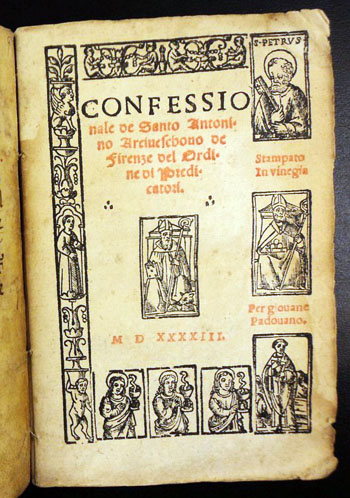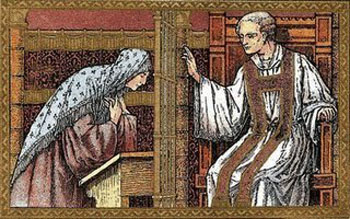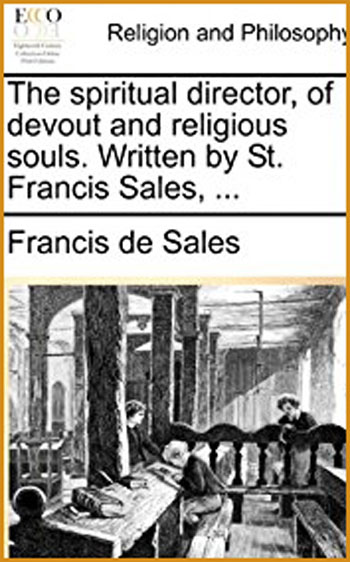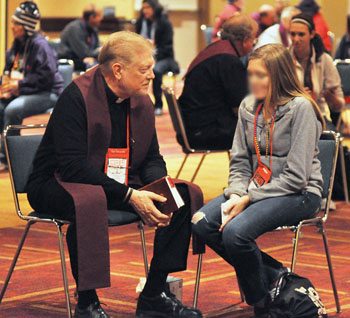About the Church
 |
 |
 |
 |
 |
 |
 |
Absolution & Spiritual Direction
Hello,
I was wondering if Fr. Alvarez Norton could answer a few questions. I liked his article on the Sacrament of Penance and have had a few questions for a long time.
First, I asked a traditional priest once to repeat the absolution because I didn't hear it, and he said I should not ask this, that he said it and that was that. I couldn't hear him, he spoke very low so I went to confess to another priest. Did I need to do that or am I being scrupulous? I know I have the tendency to be so.
Second, this same traditional priest wants to be my spiritual director, and told me I need one. So he is always asking questions about my life. It seems today everyone has a spiritual director and if you don't, you won't progress in the spiritual life. I was told that the only safe and sure way is to obey a spiritual director, then if I do something wrong that he advises, I am not responsible but he is.
 I'm not sure about all this, but want to be on the safest and best path.
I'm not sure about all this, but want to be on the safest and best path.
I hope you can help me with this,
A somewhat scrupulous penitent,
A.L.
Fr. Alvarez Norton responds:
Dear A.L.,
From your second paragraph, I understand that you know the priest to the point of trusting that he has sufficient knowledge of the ritual and the correct form of the Sacrament, that he acts regularly according to it, that he would not refuse to give you absolution intentionally and without informing you.
I – Regarding the absolution:
With these presuppositions, I must mention two things:
1. That, for pastoral reasons, the Church recommends the priest give absolution in a low voice, to ensure discretion and prevent others in the Church from being aware whether he has granted or denied absolution. (1)
2. The fact that you could not hear the absolution is not a cause of invalidation of the Sacrament. (2) This is a fact about which you can have certitude.
Now, as you probably know, usually the traditional independent priests do not have ordinary jurisdiction for Confessions. We have a supplementary jurisdiction that we receive from the Church in order to save as many souls as we can, souls of persons who – suffering in this terrible crisis of the Faith – come to us asking for the Sacraments.
This point is important to note because – even when I consider that the penitent should be able to hear the absolution – since you are the one who freely requested the Sacrament from the hands of that priest, you should consider that he is a judge in front of whom, from the moment you knelt in his confessionary, you implicitly accepted both the penance and the way in which he gave it to you. (Remember, we are talking about a traditional priest using the traditional ritual).
 Regarding that ritual, the absolution is given by the priest at the time when you are praying your Act of Contrition, which is another factor that can make it difficult for you to hear the absolution. However, it also usually allows enough time for the priest to complete the absolution.
Regarding that ritual, the absolution is given by the priest at the time when you are praying your Act of Contrition, which is another factor that can make it difficult for you to hear the absolution. However, it also usually allows enough time for the priest to complete the absolution.
Now, as I said in the first paragraph, I am supposing that you know the priest so, logically, you have a compelling reason to go to him. You can ask him to repeat the absolution - I see no problem with that - but you have to accept the refusal if he says no.
I can advise the priest through this response to take into consideration the situation of the penitent and to speak a little louder in order to be heard. Besides this, there are many reasons he could have had to deny repeating the absolution (and many of those are very good reasons), that I will not delve into in this answer (3) since the full circumstances are unknown and confession is something very private. Therefore, I can just give you general rules to consider with “freedom.”
Finally, since the salvation of your soul is very important to me, I cannot advise you (just for this reason) to not go to Confession (I don’t know how many other options you have in your area), but, of course, only you can choose a confessor and a spiritual director. No priest can impose anything on you regarding this personal decision.
II - Regarding spiritual direction:
We must distinguish three things:
1. Spiritual direction is not something new. Countless saints have recommended it: to give some examples I can mention St. John of Avila, St. John of the Cross, St. Teresa of Avila, San Vincent Ferrer and St. Francis de Sales.
 From the earliest formulators of Christian spirituality (Evagrio Ponticus, Casiano, St. Benedict) to the most notable authors of spiritual theology of the first half of the 20th century (De Guibert SJ, Naval CMF, Tanquerey, Garrigou-Lagrange OP, Royo Marín OP), all have concurred in having a great appreciation of spiritual direction. St. Francis of Sales dedicated a whole chapter of his book Introduction to Devout Life to "The Need of a Guide for Those Who Would Enter Upon and Advance in the Devout Life."
From the earliest formulators of Christian spirituality (Evagrio Ponticus, Casiano, St. Benedict) to the most notable authors of spiritual theology of the first half of the 20th century (De Guibert SJ, Naval CMF, Tanquerey, Garrigou-Lagrange OP, Royo Marín OP), all have concurred in having a great appreciation of spiritual direction. St. Francis of Sales dedicated a whole chapter of his book Introduction to Devout Life to "The Need of a Guide for Those Who Would Enter Upon and Advance in the Devout Life."
2. I must mention that, although spiritual direction was traditionally recommended by the Church, the critical situation in which the Church finds herself makes it difficult for penitents to find many choices; that same critical situation also makes it difficult to find a good formation in spiritual directors. Therefore, it is understandable that in many cases it is not possible to have a good spiritual director. Impossibilium nulla obligatio est, no one is obliged to do what is not possible or to be exposed to a guidance that does not correspond to the principles of Catholic tradition.
Now, if one is not to be excused for superficial reasons from having a spiritual director, much less should someone who recognizes that he suffers from scrupulosity do so. On this Fr. Adolph Tanquerey said: “The best – and it can be said the only – remedy is full and absolute obedience to a wise director; because having darkened the light of our conscience, we must rely on another light. The scrupulous man is a ship without a compass or rudder, and it is necessary that another tow him.” (4)
3. One last point to mention is that no one can be forced to choose anyone as a spiritual director. You are completely free in this regard. So, if a priest tries to impose himself as your spiritual director and you do not want him, the solution is simple: Say, "No, thank you." Perhaps now more than at any other time in History, we Catholics must learn that it is sometimes lawful to say "no" without an explanation.
It is worthwhile to mention here what Sister Lucy said in her last public interview of 1957 in regard to personal spiritual reformation:
“Father, we should not wait for a call to the world from Rome on the part of the Holy Father to do penance. Nor should we wait for a call for penance to come from the Bishops in our Dioceses, nor from our Religious Congregations. No, Our Lord has often used these means, and the world has not paid heed. So, now each one of us must begin to reform himself spiritually.”
 Although she is talking here about the urgency of doing penance for personal spiritual reformation, it certainly also constitutes an important wake-up call to all Catholics to be rightly cautious and more inclined to making personal efforts to fight against sin. It is also an indirect warning to all about how difficult it is to find a good priest, which applies to our topic: each one of us should be careful in choosing spiritual directors.
Although she is talking here about the urgency of doing penance for personal spiritual reformation, it certainly also constitutes an important wake-up call to all Catholics to be rightly cautious and more inclined to making personal efforts to fight against sin. It is also an indirect warning to all about how difficult it is to find a good priest, which applies to our topic: each one of us should be careful in choosing spiritual directors.
We should take the initiative of imitating the examples of the Saints and realize that we are in times where, due to the Hierarchy's lack of Catholic doctrine, each of us has to be prepared to resolutely endure these confused times and to be more dedicated to the salvation of our souls. St. John synthesized this when he said: “He that hurteth, let him hurt still: and he that is filthy, let him be filthy still: and he that is just, let him be justified still: and he that is holy, let him be sanctified still” (Apoc 22: 1).
The worst part of this time of catacombs in which we live is not the persecution of those who try to remain Catholic but the sad situation that represents the destruction of our Temple, the Roman structure that provided a solid foundation for Catholic society (and relations among Catholics) and that was largely abandoned at Vatican Council II.
We know for sure that the gates of Hell will not prevail against the Church, but the wise system that made the expansion of Catholicism possible, the system of which every Catholic was proud, is today rejected by the Progressivism that has infested the Hierarchy. In a certain way, the Church has returned to the catacombs. In the time of the first Christians, many things were still unclear (which the Magisterium later defined and clarified). In our times, however, the confusion is so immense that our only certainty can be found in the study of the doctrine entrenched in Tradition.
Finally, there is a dictum that professors of Moral Theology used to teach in the seminary: "The spiritual director of a married woman is primarily her husband (and of a single woman, her father)." Obviously this maxim has many exceptions, but in it is something indisputable: The person with whom one shares more time or intimacy usually has the ability to observe details that others perhaps cannot see.
If you say that you are not sure that you want the mentioned priest as a spiritual director, for some reason unknown to me, continue to study, watch and pray, asking Our Lady for the grace of final perseverance and the grace to know your own faults. Maybe your husband can help you with this.
God bless you.
Fr. Paulo Álvarez Norton
Omnia cooperantur in bonum

I was wondering if Fr. Alvarez Norton could answer a few questions. I liked his article on the Sacrament of Penance and have had a few questions for a long time.
First, I asked a traditional priest once to repeat the absolution because I didn't hear it, and he said I should not ask this, that he said it and that was that. I couldn't hear him, he spoke very low so I went to confess to another priest. Did I need to do that or am I being scrupulous? I know I have the tendency to be so.
Second, this same traditional priest wants to be my spiritual director, and told me I need one. So he is always asking questions about my life. It seems today everyone has a spiritual director and if you don't, you won't progress in the spiritual life. I was told that the only safe and sure way is to obey a spiritual director, then if I do something wrong that he advises, I am not responsible but he is.

Confession suffered many changes after Vatica II
I hope you can help me with this,
A somewhat scrupulous penitent,
A.L.
Fr. Alvarez Norton responds:
Dear A.L.,
From your second paragraph, I understand that you know the priest to the point of trusting that he has sufficient knowledge of the ritual and the correct form of the Sacrament, that he acts regularly according to it, that he would not refuse to give you absolution intentionally and without informing you.
I – Regarding the absolution:
With these presuppositions, I must mention two things:
1. That, for pastoral reasons, the Church recommends the priest give absolution in a low voice, to ensure discretion and prevent others in the Church from being aware whether he has granted or denied absolution. (1)
2. The fact that you could not hear the absolution is not a cause of invalidation of the Sacrament. (2) This is a fact about which you can have certitude.
Now, as you probably know, usually the traditional independent priests do not have ordinary jurisdiction for Confessions. We have a supplementary jurisdiction that we receive from the Church in order to save as many souls as we can, souls of persons who – suffering in this terrible crisis of the Faith – come to us asking for the Sacraments.
This point is important to note because – even when I consider that the penitent should be able to hear the absolution – since you are the one who freely requested the Sacrament from the hands of that priest, you should consider that he is a judge in front of whom, from the moment you knelt in his confessionary, you implicitly accepted both the penance and the way in which he gave it to you. (Remember, we are talking about a traditional priest using the traditional ritual).

Absolution is given while the penitent recites the Act of Contrition
Now, as I said in the first paragraph, I am supposing that you know the priest so, logically, you have a compelling reason to go to him. You can ask him to repeat the absolution - I see no problem with that - but you have to accept the refusal if he says no.
I can advise the priest through this response to take into consideration the situation of the penitent and to speak a little louder in order to be heard. Besides this, there are many reasons he could have had to deny repeating the absolution (and many of those are very good reasons), that I will not delve into in this answer (3) since the full circumstances are unknown and confession is something very private. Therefore, I can just give you general rules to consider with “freedom.”
Finally, since the salvation of your soul is very important to me, I cannot advise you (just for this reason) to not go to Confession (I don’t know how many other options you have in your area), but, of course, only you can choose a confessor and a spiritual director. No priest can impose anything on you regarding this personal decision.
II - Regarding spiritual direction:
We must distinguish three things:
1. Spiritual direction is not something new. Countless saints have recommended it: to give some examples I can mention St. John of Avila, St. John of the Cross, St. Teresa of Avila, San Vincent Ferrer and St. Francis de Sales.

St. Francis de Sales wrote wisely on spiritual direction
2. I must mention that, although spiritual direction was traditionally recommended by the Church, the critical situation in which the Church finds herself makes it difficult for penitents to find many choices; that same critical situation also makes it difficult to find a good formation in spiritual directors. Therefore, it is understandable that in many cases it is not possible to have a good spiritual director. Impossibilium nulla obligatio est, no one is obliged to do what is not possible or to be exposed to a guidance that does not correspond to the principles of Catholic tradition.
Now, if one is not to be excused for superficial reasons from having a spiritual director, much less should someone who recognizes that he suffers from scrupulosity do so. On this Fr. Adolph Tanquerey said: “The best – and it can be said the only – remedy is full and absolute obedience to a wise director; because having darkened the light of our conscience, we must rely on another light. The scrupulous man is a ship without a compass or rudder, and it is necessary that another tow him.” (4)
3. One last point to mention is that no one can be forced to choose anyone as a spiritual director. You are completely free in this regard. So, if a priest tries to impose himself as your spiritual director and you do not want him, the solution is simple: Say, "No, thank you." Perhaps now more than at any other time in History, we Catholics must learn that it is sometimes lawful to say "no" without an explanation.
It is worthwhile to mention here what Sister Lucy said in her last public interview of 1957 in regard to personal spiritual reformation:
“Father, we should not wait for a call to the world from Rome on the part of the Holy Father to do penance. Nor should we wait for a call for penance to come from the Bishops in our Dioceses, nor from our Religious Congregations. No, Our Lord has often used these means, and the world has not paid heed. So, now each one of us must begin to reform himself spiritually.”

A casual Novus Ordo confession at the WYD
We should take the initiative of imitating the examples of the Saints and realize that we are in times where, due to the Hierarchy's lack of Catholic doctrine, each of us has to be prepared to resolutely endure these confused times and to be more dedicated to the salvation of our souls. St. John synthesized this when he said: “He that hurteth, let him hurt still: and he that is filthy, let him be filthy still: and he that is just, let him be justified still: and he that is holy, let him be sanctified still” (Apoc 22: 1).
The worst part of this time of catacombs in which we live is not the persecution of those who try to remain Catholic but the sad situation that represents the destruction of our Temple, the Roman structure that provided a solid foundation for Catholic society (and relations among Catholics) and that was largely abandoned at Vatican Council II.
We know for sure that the gates of Hell will not prevail against the Church, but the wise system that made the expansion of Catholicism possible, the system of which every Catholic was proud, is today rejected by the Progressivism that has infested the Hierarchy. In a certain way, the Church has returned to the catacombs. In the time of the first Christians, many things were still unclear (which the Magisterium later defined and clarified). In our times, however, the confusion is so immense that our only certainty can be found in the study of the doctrine entrenched in Tradition.
Finally, there is a dictum that professors of Moral Theology used to teach in the seminary: "The spiritual director of a married woman is primarily her husband (and of a single woman, her father)." Obviously this maxim has many exceptions, but in it is something indisputable: The person with whom one shares more time or intimacy usually has the ability to observe details that others perhaps cannot see.
If you say that you are not sure that you want the mentioned priest as a spiritual director, for some reason unknown to me, continue to study, watch and pray, asking Our Lady for the grace of final perseverance and the grace to know your own faults. Maybe your husband can help you with this.
God bless you.
Fr. Paulo Álvarez Norton
Omnia cooperantur in bonum
- “Verba absolutionis convenit pronunciare submisse, ne si confessarius assuescat pronunciare altius, circumstantes advertant, si forte neganda sit absolution,” P. Joan Reuter S.J., Neo-Confessarius practice instructus, Paris: Editio nova emendatior, 1890, Caput VII, n. 4
- Dominicus M. Prummer O.P., Manuale Theologiae Moralis, Friburgi-Brisgoviae, Barcinone: Herder, 1955, p. 277, Art. II, para. 3a.
- What is explicit is that, according to your own words, you have a tendency to be scrupulous and, traditionally, the response in such cases should be short and decisive.
- AdolphTanquerey, A Treatise on Ascetical and Mystical Theology, Madrid, 1990 , n. 944, p. 502.

Posted September 14, 2017














